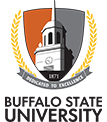About the Program
Engineering Technology Department
Technology Building 126
(716) 878-6017
https://engineeringtechnology.buffalostate.edu
Accredited by ATMAE (The Association of Technology, Management, and Applied Engineering)
About the Program
Electrical Engineering Technology, Smart Grid graduates work in the fields of electrical power generation, transmission, and distribution; industrial, commercial, and residential electrical power distribution; as well as power systems protection, control, and monitoring.
Evening study available.
Student Outcomes
Students will acquire:
1. An ability to apply knowledge, techniques, skills and modern tools of mathematics, science, engineering, and technology to solve broadly-defined engineering problems appropriate to the discipline.
2. An ability to design systems, components, or processes meeting specified needs for broadly-defined engineering problems appropriate to the discipline.
3. An ability to apply written, oral, and graphical communication in broadly defined technical and non-technical environments; and an ability to identify and use appropriate technical literature.
4. An ability to conduct standard tests, measurements, and experiments and to analyze and interpret the results to improve processes.
5. An ability to function effectively as a member or leader on a technical team.
Program Requirements
General Education 23 Requirements
33 credit hours * 33
Electrical Engineering Technology, Smart Grid Major Requirements (57 credit hours)
ENT 104 ESSENTIALS OF ELECTRICAL ENGINEERING TECHNOLOGY 3
ENT 300 MATHEMATICS APPLICATIONS IN ENGINEERING TECHNOLOGY 3
ENT 301 MECHANICS I 3
ENT 330 ELECTRICAL CIRCUITS ANALYSIS I 3
ENT 332 ELECTRICAL CIRCUITS ANALYSIS II 3
ENT 340 BUILDING INFORMATION MODELING (BIM) USING REVIT MEP 3
ENT 341 ELECTRONICS 3
ENT 342 ADVANCED CIRCUIT ANALYSIS 3
ENT 371 ELECTRIC MACHINES 3
ENT 345 DIGITAL SYSTEMS 3
ENT 346 MICROCONTROLLERS 3
ENT 445 POWER ELECTRONICS 3
ENT 461 CONTROL SYSTEMS I 3
ENT 462 CONTROL SYSTEMS II 3
ENT 465 ELECTRICAL DESIGN I 3
ENT 466 ELECTRICAL DESIGN II 3
ENT 471 POWER SYSTEMS I 3
ENT 472 POWER SYSTEMS II 3
ENT 481 RENEWABLE DISTRIBUTED GENERATION AND STORAGE 3
Required Courses Outside of Major
25-30 credit hours 25-30
PHY 107 GENERAL PHYSICS I (4-5)
or PHY 111 UNIVERSITY PHYSICS I
PHY 108 GENERAL PHYSICS II (4-5)
or PHY 112 UNIVERSITY PHYSICS II
CHE 111 FUNDAMENTALS OF CHEMISTRY I
& CHE 113 LABORATORY FOR FUNDAMENTALS OF CHEMISTRY I (4)
CIS 151 COMPUTER PROGRAMMING I
Math Option 1 (11 credit hours)
MAT 126 APPLIED CALCULUS I (4)
MAT 127 APPLIED CALCULUS II (4)
MAT 202 INTRODUCTION TO LINEAR ALGEBRA **
Math Option 2 (11 credit hours)
MAT 161 CALCULUS I (4)
MAT 162 CALCULUS II (4)
MAT 315 DIFFERENTIAL EQUATIONS (3)
Electives (6-10)
Total Credit Hours 120
*GE 23 number of credits is 33. However, required courses outside of major, such as MAT 126 or MAT 161 satisfy Mathematics and Quantitative Reasoning in GE 23; CHE 111 or PHY 107/111 satisfy Natural Science and Scientific Reasoning in GE 23. Therefore, the number of remaining credits in GE 23 required by the program is (33 – 6) = 27 cr. [In GE 23 courses for each category are counted as 3 credits each. Therefore, the total number deducted is 6 credits].
**MAT 202 for Track 1 and MAT 315 for Track 2 are preferred courses. Other mathematics courses such as Calculus III (MAT 263), or Discrete Mathematics (MAT 270) may be suggested by program advisement to better meet student’s career choices.

